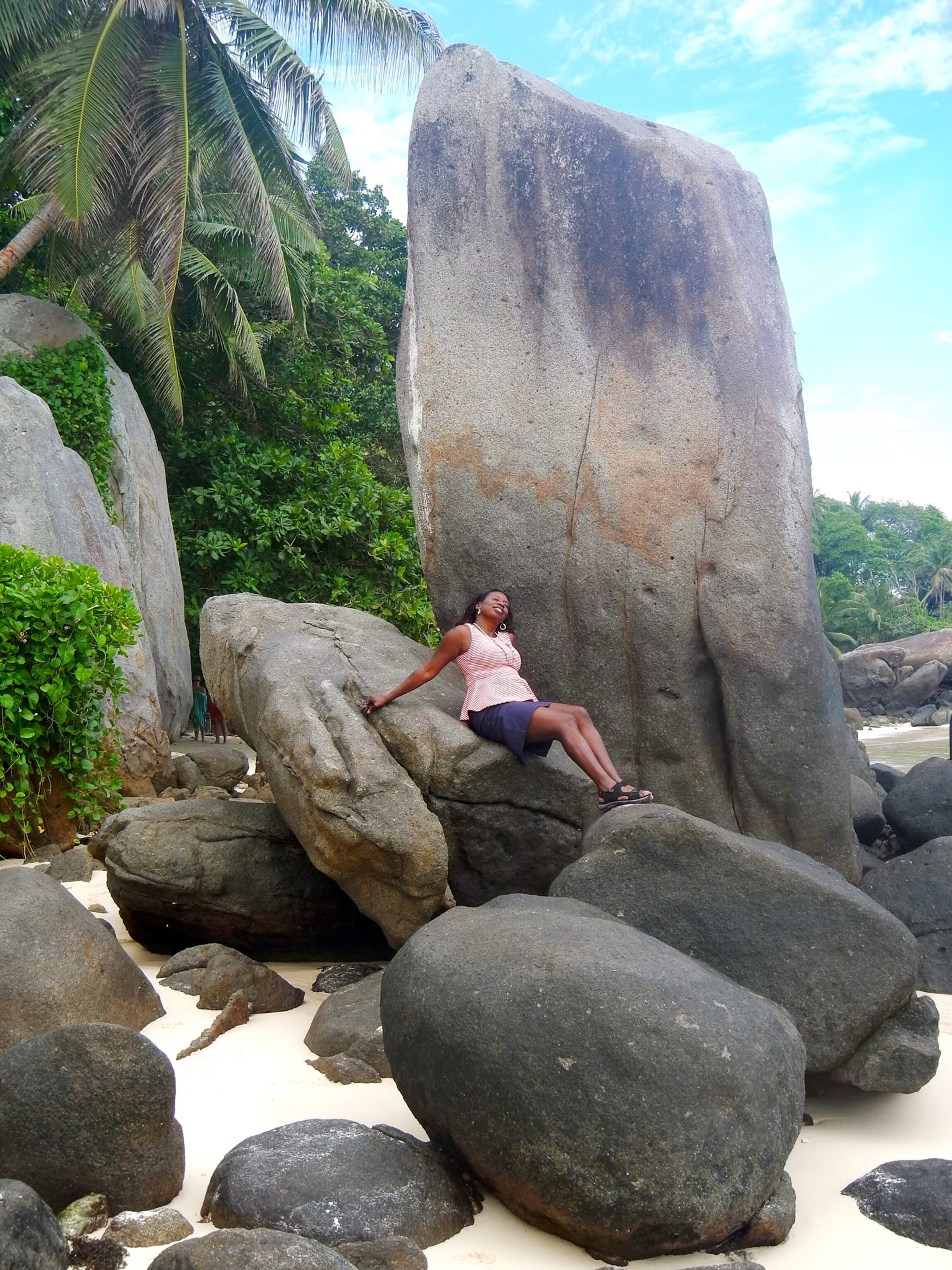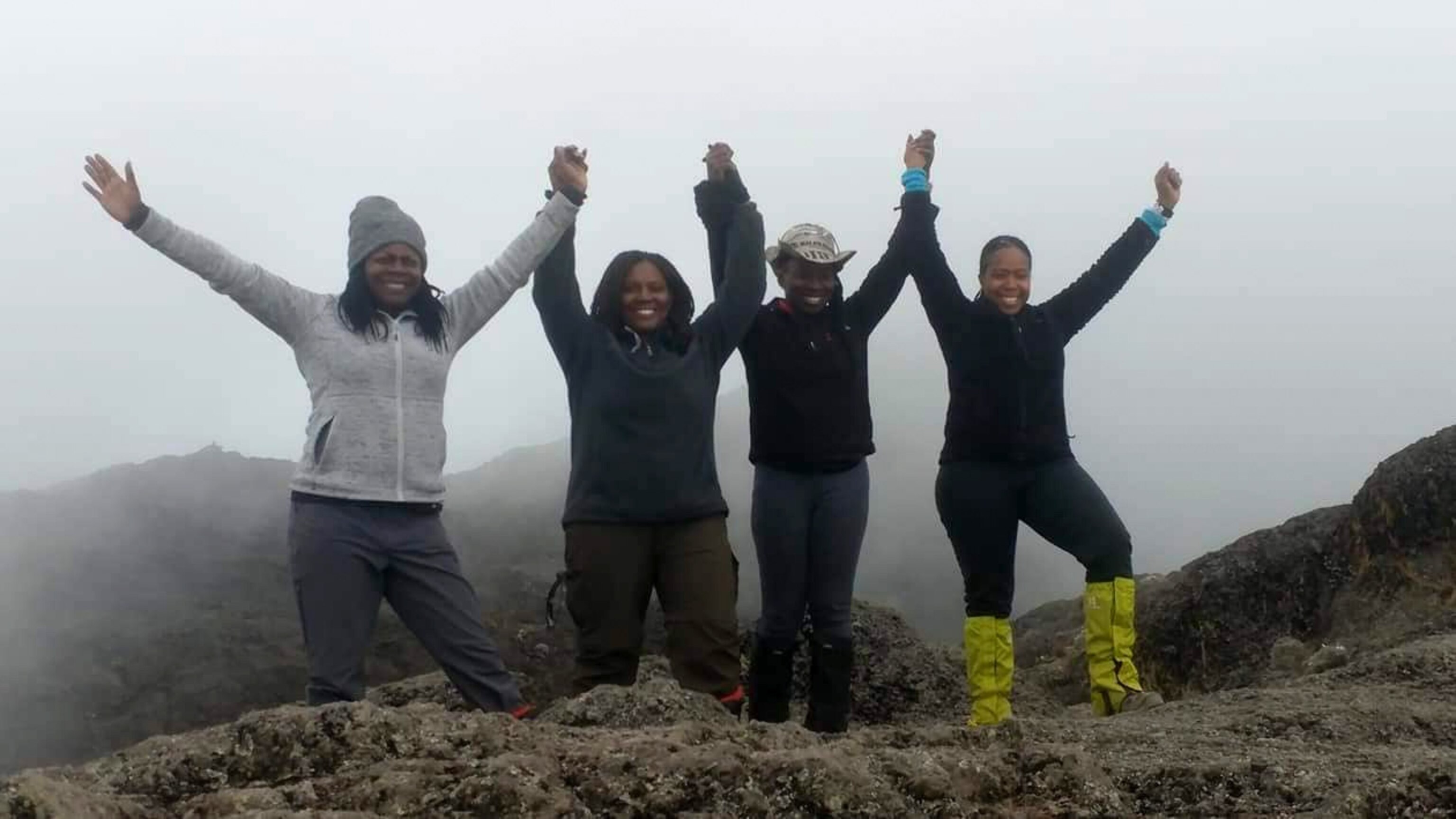
What I discovered traveling the world solo as a black woman
In the wake of devastating loss, a writer finds sisterhood and healing in daring journeys.
Sealed in the steel-caged driver’s seat and wearing a royal blue, flame-retardant jumpsuit, I stepped on the gas and whipped the NASCAR race car to 120 miles an hour. Black girl coming through!
I headed toward the frighteningly deep curve ahead on the Chicagoland Speedway, my jaw and knuckles vibrating. I was so out of my comfort zone, my heart was racing as fast as my vehicle.
I had three of my Detroit buddies—Mia, Brenda, and Angenette—to thank for this situation. We met in 2006 at my home church, Christian Tabernacle, in Michigan, forming a prayer group and coordinating new-member and baptism classes. One day Mia cornered us with a wild idea, pamphlets about white-water rafting in her hand. “Let’s do it!” “I’m in!” “What’s white-water rafting exactly?”
We christened ourselves the Dare Divas, and we soon found alter egos doing things we’d never dreamed our fortysomething selves would be doing, like zooming around a NASCAR track, riding a motorcycle, zip-lining in West Virginia, and skydiving.
(Related: Read these life-changing tales from female travelers.)
“Dare Divas Unite!” became our battle cry, our girl code mantra. When fear grips the four of us, we respond with collective encouragement to take the damn dares, scared or not.
It was this sisterhood, this zest for life, that came to my rescue in 2012 when my husband, Mannard, died unexpectedly of a heart attack. Our friendship was there for me then; and we are here for each other now, in our current world riddled with a deadly virus and continuing social injustice.
Traveling to heal
When my world fell apart after Mannard died, traditional therapy helped me deal with the grief only up to a point. I struggled with depression.
That’s when the divas rallied around me. That’s when “dare-apy” kicked in. Somehow facing the dares together made them more achievable.
Successfully completing these dares gave me the courage to push the limits. When I told my family that I was going on a 65-day cruise to Africa and Asia solo, they looked at me with worry. They mentioned gang violence in Soweto and terrorist attacks in Malaysia.
But street crime and shootings can happen right here in Detroit, I thought. I needed to travel, to get outside myself and embrace the unfamiliar. I purchased the ticket.

Solo but not alone
Out on the open ocean, I breathed in fresh air on the ship’s deck and, with journal in hand, mapped my way back to happy. I traveled to 32 countries—Mozambique, Singapore, Thailand, Seychelles. Not bad for a girl who hails from housekeepers and never vacationed anywhere until she was 22 years old and with her soon-to-be husband.
Each new place shaped what would become an improved version of my old self. I snorkeled in the Indian Ocean, went on safari in Kenya, and hiked the Great Wall of China. With each jaunt I forced myself to be brave, to feel good about trying something new, to laugh.
During my journey, there were no other African-American women on solo holiday like me. Very few African Americans, period. On a day tour in Sihanoukville, Cambodia, I visited a thatched-hut classroom. The younger kids eyed me with curiosity. I might as well have been one of the Teenage Mutant Ninja Turtles that one student wore on his T-shirt.
As I was leaving, two little girls locked arms and practiced their English while following me: “Hi-LO, hay-low.” I grinned. I really wanted to hug them, but I didn’t want to cross any lines of propriety.
Even among my brethren on the continent of my ancestors, I was a fish out of water. Like me, they had dark skin and coarse tight curls, but it was apparent that I was a Westerner. In a French-speaking hamlet in Madagascar, I was a riche femme noire.
(Related: Here’s why diverse perspectives make for better stories.)

In South Africa, Ben, the Cape Town taxi driver transporting me to the ship, was kind, polite, and confused. “How long are you working on the ship?” he asked in his accented English.
“Working?” I said.
“Yes. Will you be working on the ship for three months, five months?”
Ah, I see. “No, sir. I’m not a worker. I’m a passenger, a guest on the ship.”
“Truly?” Ben said in wonderment. “God bless you.”
In Penang and Kuala Lumpur, Malaysia, I visited both elaborately carved Hindu temples that looked like wedding cakes and Buddhist temples with Buddha statues the length of a 747. In all these places of worship, people stood praying just as fervently as my own congregation back home.
I wept alongside the Buddhist monks as I thought of my beloved Mannard. I wanted him there by my side, alive. Who would share memories of this amazing journey with me?
(Related: Discover how a traveler found hope in Bhutan’s temples and rituals.)
In Vietnam two of my cruise mates, Aggie from Texas and Lisa from New York, and I visited an open-air market where a pig limb hung on display like prized jewelry.
Aggie inspected the hoof. “It’ll be good eating for soup or stew,” she said.
Market vendors offered samples of sautéed meat with onions and peppers. I took one of the toothpick skewers, chewed, and swallowed.
“You do know that’s snake,” said Lisa.
No, I did not. I thought it was tasty, but I stopped eating.
“Oh, Sheri,” Aggie said. “It’ll digest just like chicken or steak. You’ll be fine.”
At the Great Wall of China, I said a silent grateful prayer as my journey came to an end. I thought of Mannard. I thought of the Dare Divas and sweet Aggie from Texas. I was not alone after all.
Looking back on that soul-searching, healing journey so many years ago now, I realize that dares have taken on a new meaning for me. We find ourselves in times where it takes courage just to live your daily life—just to be able to breathe. It’s real and raw and not nearly as enjoyable as jumping out of an airplane at 10,000 feet.
But I know I’m not alone. The divas and I are already planning our next trip post-pandemic (Iceland, here we come!). Together, when we face something daunting, foreign, uncomfortable, something that we believe might kill us, we will weather it, digest it, conquer it, learn from it.
And we will be fine.